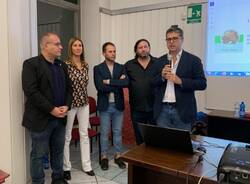Malpensa or Linate? An industrial plan for air transport in Lombardy is a better option
The future of Malpensa Airport was one of the topics discussed by the Association of Industrialists of Varese Province. Brugnoli: “The main goal is to increase Malpensa’s business, by exploiting the economic potential of its natural catchment area.”
 The question of Malpensa’s future was the tacked at the Committee of the Association of Industrialists of Varese Province, when the Chairman of the association, Giovanni Brugnoli, reported the discussions that took place days ago at the Roundtable on Competitiveness and Development, at Malpensafiere.
The question of Malpensa’s future was the tacked at the Committee of the Association of Industrialists of Varese Province, when the Chairman of the association, Giovanni Brugnoli, reported the discussions that took place days ago at the Roundtable on Competitiveness and Development, at Malpensafiere.
It was inevitable that an old clash should re-emerge, the one between Malpensa and Linate, with Malpensa being “robbed” by Linate of many international routes, with a subsequent weakening of its role as an airport hub in Central Southern Europe, a role that the European Union had wagered on years ago, when it funded the construction of the new Terminal 1 (Malpensa 2000).
Brugnoli said, “This is only one, partial aspect of the matter. It is certain that the flights were not divided fairly between the two airports, also as a result of the forced interpretations of the decree of the Transport Minister at the time, Pier Luigi Bersani. Consequently, we cannot acquiesce to these forced interpretations, or think that we can go on in this way, by further increasing the flights in Linate, which has already reached saturation point. We should, however, also consider another aspect, namely what happened to Malpensa after the so-called de-hubbing by Alitalia. Malpensa has partly recovered and this demonstrates that a hub need no longer be established on the basis of a particular airline, but can be established in accordance with new models, such as the multi-vector, which is the model designed with the Emirates for the Dubai-Malpensa flight, which was subsequently extended with the Malpensa-New York flight.
“The main goal is to increase business at Malpensa by exploiting the economic potential of its natural catchment area. Obviously, not with low-cost flights, but with freight traffic, and with prestigious routes, namely those that can include Malpensa on the long intercontinental routes of commercial and tourist traffic.”
“The real question,” Brugnoli said, “is not only to favour our economic operators logistically by providing them with local air connections with the rest of the world, that enable them to take off from an airport nearby, but to appeal to the economic operators in the rest of the world, who would obviously be more inclined to focus on other European airports, such as Paris, Frankfurt and London, in the absence of an important intercontinental airport in Milan. This is why it is necessary to defend Malpensa and develop it, because it is a strategic airport for the whole of North Italy. The question f Malpensa does not affect only Lombardy, or even Varese Province. It affects the whole country.”
Three things have to be done. The first is to intervene, as is already being done, to prevent the planned partnership between Alitalia and Etihad from being outclassed, not only at Malpensa, but also at Fiumicino, by the existing co-operation agreement between Etihad and Air France-KLM. Both would obviously be interested in using the Italian airports only as a catchment area to take passengers to their hubs, and from there, on to America and Eastern Asia, using their aircraft.
The second is to deregulate flights, letting demand, not supply, say whether or not Malpensa is ready to be developed. We can be reasonably confident. Malpensa is, in fact, located in a central area in the north of the country, the most economically developed in Italy, where there is the greatest demand for air traffic. Moreover, there are better roads, motorways and rail connections to Malpensa today, than ten years ago, and these are destined to improve further in the coming years. Expo will provide an opportunity to test deregulation. It will have to be done, if we do not want to run the risk of many foreign visitors coming to Europe via destinations in France, Switzerland and Germany, and staying there to spend maybe a week, coming to Expo on a short-medium distance continental flight, and going back on the same day.
The third goal is to stop the bickering in the relations between the airports in Lombardy. We must not forget that Linate and Malpensa are not the only airports. There are also Orio al Serio and Montichiari. It is inconceivable that each should try to obtain advantages for itself, thereby wasting resources, with flights unable individually to break even. During the recent Discussion on Competitiveness and Development, the President of Lombardy Region, Roberto Maroni, claimed that it was necessary to create a strategic industrial plan for the airports in Lombardy. According to Giovanni Brugnoli, this is now more necessary than ever, and deserves the utmost encouragement. "We must demonstrated with facts that the planning of air transport is achieved by scheduling that takes account, above all, of the market. It is completely different from the recent air transport development plan presented by the government, in which, in addition to Malpensa, another ten airports, which are actually only of regional interest, were defined as strategic".
Without taking anything away from these other airports, Malpensa cannot be put on the same level, it deserves greater attention, because the real air transport market is here. Either we acknowledge Malpensa as the natural hub of the whole of North Italy, or it is useless to talk about scheduling for this kind of transport. The hope is that politicians and the territory can team up to coordinate their interventions to favour Malpensa, overcoming party differences and rivalries between the different regions in the country.
Besides the work of the Association of Industrialists Committee, there was also a meeting between the committee and the General Director of Confindustria, Marcella Panucci, who gave a well-received speech, which was followed by a detailed discussion, during which the most current topics concerning the industrial sector, as well as the current political situation and its contrasts, were dealt with.
La community di VareseNews
Loro ne fanno già parte
Ultimi commenti
malauros su I no vax sono tornati a colpire in provincia: imbrattati i muri della redazione di Varesenews
Felice su I no vax sono tornati a colpire in provincia: imbrattati i muri della redazione di Varesenews
PaoloFilterfree su A Varese Salvini prova a ricucire passato e futuro della Lega, ma Bossi non c'è
axelzzz85 su A Varese Salvini prova a ricucire passato e futuro della Lega, ma Bossi non c'è
elenera su A Varese Salvini prova a ricucire passato e futuro della Lega, ma Bossi non c'è
Roberto Colombo su A Varese Salvini prova a ricucire passato e futuro della Lega, ma Bossi non c'è














Accedi o registrati per commentare questo articolo.
L'email è richiesta ma non verrà mostrata ai visitatori. Il contenuto di questo commento esprime il pensiero dell'autore e non rappresenta la linea editoriale di VareseNews.it, che rimane autonoma e indipendente. I messaggi inclusi nei commenti non sono testi giornalistici, ma post inviati dai singoli lettori che possono essere automaticamente pubblicati senza filtro preventivo. I commenti che includano uno o più link a siti esterni verranno rimossi in automatico dal sistema.